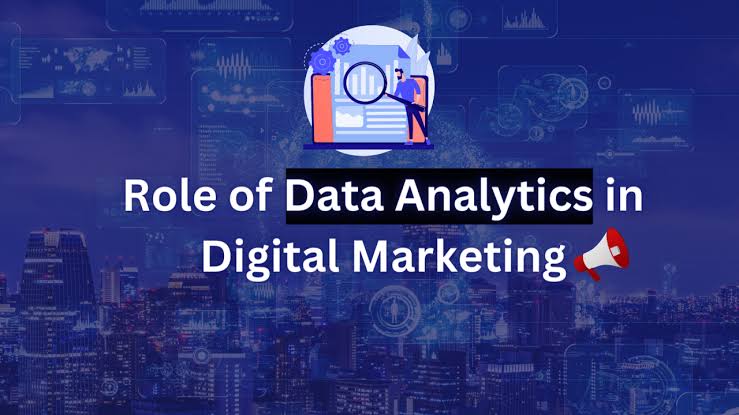Explore how data analytics transforms digital marketing by enabling informed decision-making, enhancing targeting and personalization, and optimizing campaign performance. Discover key components, practical applications, and the benefits of leveraging data to drive marketing success.
In the fast changing world of marketing data analysis has emerged as a crucial tool for businesses aiming to refine their approaches and achieve tangible outcomes. By harnessing data marketers can gain insights, into consumer behavior, campaign effectiveness and industry trends. This article explores the importance of data analysis in marketing highlighting its advantages key elements and real world applications to assist companies in improving their marketing strategies and driving success.
Grasping the Concept of Data Analysis in Digital Marketing
Data analysis involves examining data to reveal patterns, relationships and insights that guide decision making. Within the realm of marketing data analysis offers marketers a comprehensive understanding of their strategies effectiveness and potential enhancements. This process utilizes techniques such as analysis, data visualization and predictive modeling to convert data into actionable insights.
Advantages of Data Analysis in Marketing.
Making Decisions Based on Data One of the key advantages of data analysis is its ability to support decision making. By examining data from sources marketers can determine what strategies work and which ones don't. This allows them to adjust their approaches based on evidence rather than assumptions. Such a method reduces the risk of allocating resources to ineffective tactics and maximizes return on investment.
Improved Targeting and Customization Data analysis empowers marketers to gain insights into their audience segments. By studying demographic, behavioral and psychographic information marketers can design campaigns that specifically appeal to groups. This level of customization enhances the relevance of marketing messages and boosts engagement rates resulting in increased conversion rates and customer satisfaction.
Enhancing Campaign Effectiveness, Examining campaign data allows marketers to assess how well their strategies are working. Metrics like rates, conversion rates and cost per acquisition offer valuable insights into a campaigns performance. By spotting trends and patterns marketers can fine tune their campaigns on the go by adjusting elements like ad copy, visuals and targeting settings to boost results.
Utilizing Analytics, Predictive analytics uses data to predict outcomes. In the realm of marketing this means leveraging past performance data to foresee trends, customer behaviors and campaign effectiveness. Predictive models empower marketers to anticipate shifts in the market, recognize emerging opportunities and make proactive choices to maintain a competitive edge.
Essential Elements of Data Analysis, in Marketing.
Step in analyzing data involves gathering information from sources. This includes tracking website traffic, monitoring social media engagement, assessing email campaign performance and analyzing sales figures. Tools like Google Analytics, social media analytics platforms and customer relationship management (CRM) software are commonly utilized for this data collection process.
Once the data is collected it undergoes processing and cleaning to ensure accuracy and consistency. This step involves eliminating duplicates, correcting errors and standardizing formats. Proper data processing prepares the information, for analysis making it easier to detect patterns and valuable insights.
The stage of data analysis is where the collected data is scrutinized to uncover insights and trends. Various techniques such as statistics, correlation analysis and regression analysis are employed to interpret the data. Additionally advanced approaches like machine learning and artificial intelligence can be used to identify patterns and forecast future outcomes.
Data Visualization: Presenting data visually through charts, graphs and dashboards is known as data visualization. This technique enables marketers to grasp information swiftly and convey insights to stakeholders. Popular tools for creating data visuals include Tableau, Power BI and Google Data Studio.
Reporting and Actionable Insights: The last step involves generating reports and extracting insights from the data analysis process. Reports encapsulate findings, identify areas for enhancement and offer suggestions to optimize marketing strategies. These insights play a role, in decision making by assisting marketers in implementing changes based on data.
Real World Uses of Data Analytics, In Online Marketing.
Audience Segmentation: Through data analysis marketers can divide their audience based on factors like age, interests and buying habits. This division allows for the creation of marketing strategies that cater to the preferences of different groups. For instance an online store can categorize customers into groups such as regular shoppers, occasional buyers and newcomers to tailor their marketing messages accordingly.
Campaign Optimization: By consistently tracking and assessing how campaigns are doing marketers can make changes to improve their effectiveness. For example if an advertisement isn't performing well marketers can experiment with variations and choose the one that works best. Additionally data analysis can help determine the channels and timings.
Mapping the Customer Journey: Data analysis plays a role, in charting out the customer journey by monitoring interactions at various touchpoints. By understanding how customers navigate the purchasing process marketers can pinpoint moments of impact and address potential challenges. This knowledge aids in crafting a engaging customer experience that boosts conversions.
Content Strategy: Assessing data on content performance offers insights, into what types of content resonate with the audience. By looking at metrics like engagement rates, shares and time spent on a page marketers can identify formats and topics. This information informs the creation of a content strategy that aligns with audience interests and preferences.
Conclusion
Data analysis is essential, in todays marketing landscape providing valuable insights that guide decision making and improve campaign effectiveness. Marketers can utilize data to make choices tailor their approaches and refine their strategies for outcomes. With the ever changing digital environment the capacity to leverage and interpret data will continue to be crucial, for achieving marketing success and maintaining a competitive edge.
